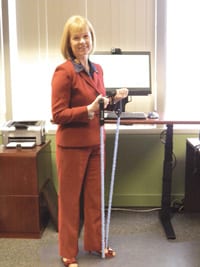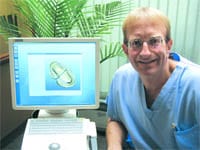Promoting Good Health – Insurance Companies Put Increasing Emphasis on Wellness
Most Americans know they should eat a balanced diet, exercise, get enough sleep, and try to reduce their stress, but this knowledge is often simply not enough.
“There are no secrets, but we are constantly in a race against the clock, so people give up before they even start,” said Lynn Ostrowski, director of brand and corporate relations for Health New England. “It involves a commitment and making these things a priority, but in our culture, there is such an emphasis on a quick fix that people would rather take a pill to lose weight than increase their activity and watch their eating habits.Beth Foley agrees. “There is a big gap between knowledge and action; it’s our job not only to educate members but help them take action,” said the senior director of quality services for Fallon Community Health Plan.
To meet that goal, health-insurance companies are creating new wellness programs, which range from smoking cessation to online assessments with cash incentives, to telephone counseling and screenings offered within the workplace. The programs are in line with the federal government’s Affordable Care Act goal of creating new incentives that build on existing wellness programs, as well as the healthcare cost-containment bill passed by the state Legislature and signed into law by Massachusetts Gov. Deval Patrick
Ostrowski said there is a lot of activity and progress being made to transform the cost of healthcare services and the way they are delivered. “There is also a lot of legislation around giving people incentives to take better care of themselves.”
All this is important because the choices people make each day ultimately affect their overall health and finances. “People need to realize that their personal choices and habits have a profound impact on the cost of healthcare,” said Ostrowski.
In fact, studies show that more than 70{06cf2b9696b159f874511d23dbc893eb1ac83014175ed30550cfff22781411e5} of employee healthcare costs are related to lifestyle choices. “There are lots of ways people can incorporate small changes into their day,” Ostrowski said. “But they need to work toward one goal at a time. If you try to do too much, you won’t stick with it because it’s too much of a shock to your system and your schedule.”
Foley said Fallon representatives understand that change is personal. “It’s not what we think will make people healthy, it’s what they believe they can achieve,” she said, adding that the company’s goal is to give members the tools, resources, support, and education they need to take care of themselves, while respecting their cultural differences.
Paving the Way
Health New England has a relatively new program called Healthy Directions that is available to HNE associates, employer group worksites, and members. “We recently purchased an integrated online platform from WebMD; the integrated platform contains a health assessment, health library, and a digital health assistant/health coach, as well as numerous other tools to help members improve their overall health and well-being,” Ostrowski said. “HNE’s Health Programs Department provides members with the opportunity to register for the portal, take the health assessment, and utilize any of the other online tools that may interest them.”
HNE is leading the way for other companies by offering a comprehensive wellness program that encourages its own employees to take personal responsibility for their health. The company provides cash incentives of up to $400 a year to associates who participate in its Healthy Directions Program. The incentives include $125 for completing biometric measures (blood pressure, body-composition analysis, height/weight, cholesterol panel, and blood glucose level) and the online health assessment. In addition, $50 can be earned by maintaining or achieving biometrics within optimal ranges; $25 per quarter can be earned by participating in one of the three activity challenges offered per quarter, and associates are eligible for a $150 Fitness/Weight Watchers reimbursement program.
There are also incentives built into the program that encourage employees to become tobacco-free. “Our president and CEO, Peter Straley, believes that, as a managed-care organization, it is important that HNE be a role model for other employers,” said Ostrowski.
Although changing one’s lifestyle is not easy, Ostrowski says it can be done without a lot of effort. She is a full-time HNE associate and mother of three who manages to fit exercise into her day. “I always use the stairs and park in the last parking spot in our garage. I have pedals under my desk and use my breaks during the day to get in the recommended 30 to 60 minutes of physical activity. People think they have to go out and run three miles, but they can break their exercise into three 10-minutes sessions and gain a similar benefit.”
HNE has a stair-climbing group, and participants use their break time to walk up the building’s 25 flights of stairs. “We also have a team that takes part in the American Lung Association’s Climb of Your Life annual challenge. There are a lot of things you can incorporate into your day and the workplace that encourage physical activity,” Ostrowski said.
HNE recently installed two tread desks and resistance-training stations in its call center to give people who can’t leave their desks an opportunity to get some physical activity during the workday. Some associates use them during conference calls or during their breaks. In addition, they are provided with stretch bands and can click on a video and do a three- to five-minute stretch-band exercise session in their cubicle. “The goal is to help people make small changes that they will stick with over time,” she noted.
Innovative Programs
Fallon Community Health Plan (FCHP) also has new programs aimed at helping people take charge of their health, which include screenings that can be conducted in businesses with qualifying plans.
Some are unique, such as a facial analyzer that shows suspicious areas that could become cancerous as a result of sun damage. “It’s part of a larger sun-safety program,” said Health Promotions Manager Karen Gagliastre.
There is also a machine that people blow into that measures the amount of carbon monoxide in their body, which could be high if they smoke or live in a home with a faulty heating system. “It’s a call to action for smokers,” said Gagliastre, adding that, although smoking has declined in Massachusetts, almost one out of five people still smoke, and new smokers continue to join their ranks.
Another screening involves a device that tests people’s grip strength, which can lead to a discussion about strength training, while a sensor held between the fingertips measures body temperature and provides insight into a person’s stress level.
“We are trying to raise awareness about how important it is to have regular checkups and screenings to detect disease early,” Gagliastre said.
Foley concurred and said early detection can prevent a disease from becoming a chronic condition. “Things like poor diet, a sedentary lifestyle, and stress are at the heart of most disease. If we can get people to stop smoking, get off the couch, eat healthier, and manage their stress, we can make a lot of headway into preventing the diseases that affect much of America, like respiratory and heart disease as well as diabetes.”
FCHP also offers a 10-week smoking cessation program called Quit to Win that can be conducted onsite at a business or via individual telephone coaching. “We look at the reasons why people smoke and help them develop a plan to quit and stick to it,” Gagliastre said, adding that the Quit to Win program has an annual quit rate of more than 30{06cf2b9696b159f874511d23dbc893eb1ac83014175ed30550cfff22781411e5}, which is much higher than the national standard.
Another program, titled 50 Days to Fabulous, addresses a different topic each week ranging from portion control to how to read food labels to stress reduction and relaxation, while Fallon’s Lunch and Learn initiative is a speaker-based wellness program that focuses on nutrition, stress reduction, and physical activity. And this month, FCHP is introducing its Healthy Health Plan, which is open to qualifying small and large businesses. The plan invites subscribers to take an online health assessment and earn $50, after which they are presented with a plan of potential action that could include telephone and web-based health coaching or workshops. “If they complete the action plan, they are eligible for another $150. It’s not based on the outcome, but it’s taking the action that counts,” Gagliastre said.
Another reimbursement option, called It Fits, has been in place since 2004. Qualifying members can receive up to $200 per individual or $400 for a family, which they can use to pay for gym memberships, Pilates and yoga classes, Weight Watchers programs, school and/or and town sports programs, ski passes, road-race fees, exercise equipment, children’s sports team fees, skiing, or any other physical activity. “When we saw towns and cities having budget problems, we didn’t want our members to have to tell their children they couldn’t play sports because they couldn’t afford it,” Gagliastre said, explaining the reasons that led the company to institute the plan.
Fallon also offers a free Silver Sneakers program for seniors in its Medicare Advantage plan at facilities such as participating health clubs or YMCAs, promoting involvement in exercise and social activities. “The social interaction is important because isolation can lead to depression, sedentary behavior, and a reduced quality of life,” Gagliastre said. “I have seen the magic of this program. People who participate in it have a great outlook and look forward to the social gatherings and classes.”
Improving Care
Blue Cross Blue Shield of Massachusetts (BCBS) President
and CEO Andrew Dreyfus encourages and leads his own company’s wellness program for employees. And this will be the fifth year the company will hold a Municipal Blue Innovation Awards program that recognizes cities and towns that successfully implement health and wellness initiatives and plan design changes to make healthcare more affordable, while improving employees’ health.
These have included walking clubs and their own ‘biggest loser’ challenges.
But despite these gains, “employer groups of all types are coming to us without any experience, so we have designated wellness consultants who work with them to develop a long-term plan, which is often three years,” said Amy O’Neil, director of Wellness Integration and Technology at BCBS. They usually often start off small and grow the program slowly. “But three years is long enough to get people engaged and measure the results.”
Small businesses have also been turning to BCBS for help in reducing costs. To meet that goal, the company developed and launched a Healthy Actions program last August for businesses with between one and 50 employees. While developed to meet the needs of small employers, it is also available to individuals.
The program makes cost savings available to employers and participants by encouraging a partnership between subscribers and their physicians to improve their health. An important component is an online risk assessment that the subscriber takes, then brings to their doctor, who completes the biometric portion. “If the subscriber’s biometric measurements fall within a healthy range, they get a Visa gift card for $300,” O’Neil said.
If they do not fall within healthy parameters, they set goals to improve their scores. Nonetheless, they receive $100 for participating, and the physician is also compensated for filling out the Clinician Health Review form. If the person meets the goals they set with their doctor within their insurance calendar year, they receive another $200. In addition, employers are eligible to receive a reward of up to 5{06cf2b9696b159f874511d23dbc893eb1ac83014175ed30550cfff22781411e5} of the cost of their health-insurance premiums based on employee participation in Healthy Actions.
“It’s a very popular program and strengthens relationships between doctors and their patients,” O’Neil said. “We’re targeting lifestyle behaviors that lead to chronic diseases. Wellness is not an exact science, and we can all work on things, even if we are within the healthy range.”
BCBSMA also offers a wide range of programs for large companies that provide their own financial-wellness incentives, which can range from a reduction in premiums to gift cards. Designated consultants work with employer groups to offer seminars as well as skin screenings, flu clinics, health fairs, walk stations, smoking cessation programs, help with diets, gym reimbursements, and many other things.
O’Neil said there are many different price points, and choices can include inexpensive online programs. But the programs are innovative and focused on outcomes, such as smoking cessation, stress reduction, and an increase in
physical activity through the use of tools such as pedometers.
“Everyone is different. So our goal is to offer programs in multiple modalities and configurations because one size doesn’t fit all,” O’Neil said, adding that the company is also using social media to engage interest. “We know the social aspect is very important in motivation.”
Bottom Line
O’Neil told HCN that healthcare plans can be confusing and expensive.
“But the quality of people’s lives are really impacted by things that could be avoided,” she said. “We are all living longer, and people are in charge of their own lifestyles. It’s something they can control that can make them more productive and ultimately will lower the cost of healthcare. And if everyone made healthy choices, they might be able to avoid some of the chronic conditions that are so prevalent today.”
Gagliastre agreed.
“Many of the reasons people seek health care are for preventable conditions, and if we can help them make changes, we can put a dent in healthcare costs,” she noted. “Prevention is cheaper than treatment.”




Comments are closed.